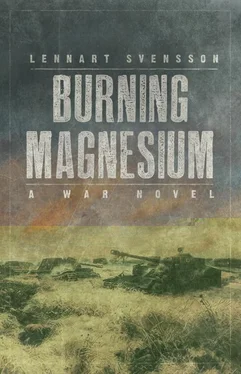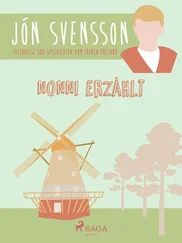Many tricks were used to achieve the best possible starting position for the attack. Uncoded, in substance misleading, statements had been sent by radio, easy for the enemy to intercept. Troops in sectors that were not to be attacked were revving engines and the like, simulating preparations for an attack.
Inspired by the Russian attack methods employed in 1943, the first German incursion would be made by infiltration. Battalion Wolf, to which Arno’s Platoon belonged, was the vanguard of the intrusion in the southern spearhead sector. Here the Panzer Battalion at the head, the one detailed to break through the frontline, had to advance along four roads. On this side of the main line, Battalion Wolf was to clear the area of enemy units such as outposts and sentry groups. As a Storm Battalion this vanguard would enter the enemy lines covertly, on foot, and surprise the defenders. Once the way was clear, the armour would sally forth and break through the heavily defended main line some kilometre further away.
Battalion Wolf didn’t stand alone during this operation. It belonged to Kampfgruppe G, a brigade-sized unit consisting of three Panzer Grenadier Battalions, one Battalion of Panzer III’s and IV’s, an Artillery Section, a Maintenance Company and a Combat HQ.
Thus it was. 1 stArmy would attack, attack in order to retreat and to reach the German lines 250 km to the northwest. And everything in the initial stage depended on the units of “terrain artists, rangers and athletes” – in other words, the infantry. Sitting in his orderly room Arno stubbed out his cigarette, turned out the light, took off his boots and went to bed. He needed a little sleep before it started. He didn’t need an alarm clock. He had one built in. If he told himself to wake up at a certain time, he just did it.
+++
Arno opened his eyes, blinked and reached for the watch.
02.20. Forty minutes to marching off. The clock had well passed midnight, so the date was now March 29.
It was the room with a bed, a chair and a table. The orderly room in the barracks. A window on the short side was boarded up. There were some gaps in the boards but no light penetrated through the cracks.
Arno pulled on his socks, stepped into his high-legged boots, put on his uniform coat of grey-green cloth and, over it, a gabardine camouflage smock. It was reversible, white on one side and with woodland camouflage on the other. The last heavy snow of winter had fallen, so the standing order was to have the white side out. Then Arno donned his Sturmgepäck. It was made of blackened leather and consisted of a belt with shoulder straps. Onto this harness were attached ammo pouches, a water bottle, a close combat knife in a sheath and a bread bag.
Next, Arno picked up his assault rifle. He sat down at the table with his feet on the chair, opened an ammo packet and gently fed 7.92 mm cartridges into the magazines. Then he checked the safety catch and clicked a magazine into place.
He stepped down from the table and took out the platoon radio, a rather compact gadget of 15 x 20 x 3 cm with a folding antenna; he put it under his belt. Last of all he stuffed a pack of cigarettes in his pocket, slipped on a pair of brown pigskin gloves, slung a map case round his neck, put on his helmet and took the rifle in his hand. The helmet was covered by a white camouflage cloth.
This is it, he thought. Being a platoon leader obliges…! In order to gather himself he did what he did in Stalingrad. Standing at the table, fully equipped, ready to go into battle, he said to himself: “I Am”. It was the old biblical affidavit, the eternal formula of ontology and ethics. And thus he was prepared for anything.
There is no greater wisdom than this: I Am. So simple, and so difficult. But the simple is difficult as Clausewitz said.
+++
Arno went off along a corridor, went down the stairs and then along another corridor leading out of the house. Thus he found himself standing in a courtyard framed by three rows of houses. Shadows moved across the yard. Arno went towards them, halted and called out:
“Platoon fall in!”
A line was formed. A strange light hovered over them. It was winter, overcast and early in the morning and therefore it should be dark, but Luftwaffe ground crew units had arranged anti-aircraft spotlights to hit the undersides of clouds as an unorthodox way of lighting up fields of movement or battle by night. The whole area was bathed in a sort of indirect light; the soldiers lined up in front of him appearing in this half unreal, like ghosts.
Arno swept his gaze along the line. There were about 25 men. Their faces were illuminated under the helmet edges, snow on the ground reflecting the artificial moonlight.
None of the soldiers said anything. Everyone looked at Arno, the Platoon Leader. He had been that for four months now. The last time little had happened. It wasn’t until last week they had had things to do – that is, preparing the breakout with reconnaissance, planning and the destruction of unnecessary supplies. Finally, they had pulled up to Point 98, having come here to this farm of three rows, situated in a desolate forest. The Platoon had participated throughout the Ukraine-retreat, had been in the battle zone for several months before the relative calm of the last month. All the soldiers, even the Squad Leaders, were German conscripts.
“Squad Leaders, report!” Arno said.
From the left was heard:
“1 stSquad, ready.”
It was Sergeant (= Unterfeldwebel ) Bauer’s somewhat shrill voice. He was also the Platoon’s deputy chief; if it were needed he could take over the lead. And if you divided the unit in two then Arno and Bauer would command their respective halves.
“2 ndSquad, ready,” was next heard from the line. It was Corporal (= Obergefreiter ) Karnow.
“MG Squad, ready,” came lastly from Corporal Deschner. MG meant machine gun. The group in question had two MG 34s. 7.92 mm caliber, rate of fire of 15 rounds per second , which is rather a lot.
This was the Platoon. Arno said:
“I take command. At ease.”
He slung the automatic on his back and moved along the rank to inspect the men. It was a symbolic check, trying to catch each man’s eye under the helmet rim. He was pleased with what he saw. No one flickered his eyes, everyone was mentally composed.
He checked his men. It was, to begin with, 1 stSquad led by Bauer. Arno inspected him and his soldiers Ilo, Henko, Ebersen, Tauber, Spiegel, Pindar, Geglo, Gipp and Rendulic. Then he went on to 2 ndSquad and its Leader Karnow and the soldiers Wagner, Gans, Hackle, Lenoir, Gero, Escher, Emostas and Esil. Last of all checked the MG Squad with its head Deschner and the soldiers Langon, Mesurier, Venlo, Venskes, Menider, Schmidt, Qvoon and Salazar.
The mainstay of the Platoon was the two MG’s, its sine qua non. To bring these into action was top priority during a regular assault – exposing the enemy to their fire, laying down a wall of lead. As indirect fire the Platoon had rifle grenades. On the battalion level there was a battery of heavy mortars, 12-cm pieces. And at company level there was a mortar unit with 8-cm pieces. This was in 2 ndPlatoon.
Arno returned to his place in front of the line. He said:
“Welcome to the countryside. Now we leave for a great adventure. Anyone who wants to stay behind? Anyone who wants to give up, surrender arms? Go ahead, it’s a free country…”
Scattered laughter. Arno continued:
“We’re going to breakout. Our Army, 1 stPanzer Armee will break away to friendly territory in the northwest. And we, Battalion Wolf’s Companies, are going at the head to clear the roads. Our Platoon will start by taking a certain outpost. We’ve been through it all before. Me and ten men will take the sentry post proper while Bauer and the rest of the Platoon bypass and clean up the rest of the deployment.”
Читать дальше












